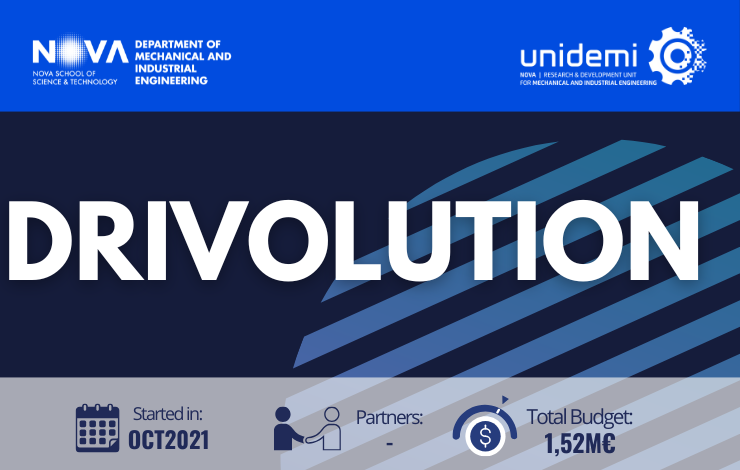
Starting Date: –
Number of Partners: –
Total Budget: –
The Drivolution Agenda arises with the objective of promoting the creation of a Factory of the Future model, based on actions capable of contributing to the four pillars of the Recovery and Resilience Plan: digital transition; ecological transition; smart, sustainable and inclusive growth and economic resilience.
From this perspective, an analysis of the challenges and needs of the automotive sector was carried out. It is intended that the response to the challenges underlying the energy transition and digital transformation in the automotive sector will create the foundations for intelligent, sustainable, inclusive and resilient growth.
With regard to the energy transition, the transition to the production of vehicles with hybrid and electric engines requires, from the outset, a vast set of modifications, both in terms of vehicle components and in terms of adapting production processes. Also at the component level, it is increasingly important to develop lighter products using alternative materials, reducing dependence on raw materials of fossil origin. The energy transition therefore requires several changes for the automotive industry, with companies having to increase the sophistication of existing products in their portfolios and reevaluate them, and above all evaluate their carbon footprint and find ways to reduce it, therefore, preference will be for more sustainable options.
For an effective transition, it is extremely important to train human resources and attract new talent, based on the establishment of partnerships with non-business entities in the research and innovation system. Digital transformation is another of the great challenges for the automotive industry, being an essential point for an effective energy transition and, as such, for the construction of the Factory of the Future.
Investment in the digitalization of operations is a current need, which requires companies to invest in new technologies and the significant improvement of their production processes, as well as in the training and hiring of qualified and specialized labor. Process automation will allow gains in productivity and greater production control, allowing for better process management. The transition to this new model must be gradual with the adaptation of human resources to the new processes.
In order to fill the existing gaps for the transition of the automotive sector, the Drivolution Agenda was designed, based on 5 lines of action:
1. Digitalization – This line of action aims to promote initiatives that clearly contribute to the digitalization of processes. In this context, the projects associated with this line of action aim to develop new logistics solutions, involving highly digitalized processes, promoting traceability and monitoring of the entire value chain of associated products. Associated with the digitalization of production processes is also the study of the integration of drones in industrial processes, in tasks traditionally dependent on human intervention.
2. Industry 5.0 – This line of action aims to develop the concept of industry 5.0 in the automotive sector, through projects that promote collaboration between new technological systems and humans in perfect symbiosis, combining technology with the humanization and sustainability of processes industrial. This line therefore involves the development of new production technologies, based on collaborative robotics, artificial vision, and the implementation of augmented reality solutions on the factory floor.
3. Safety and Ergonomics – This line of action aims to promote the development of new automotive comfort and safety systems, which can integrate new vehicle models.
4. Materials – The materials component is one of the most important in the sector. This line of action aims to develop new ways of manufacturing automotive components, through the use of alternative materials, which can contribute to reducing the associated carbon footprint and promoting the circularity of materials.
5. Specialized and digital training – The aim is to promote actions that contribute to the development of human resources skills, through specific training actions in the most critical areas of the processes, particularly with regard to the transition to more autonomous and digital processes. In this context, the aim is to create a sustainable supply of skills for the automotive sector at qualification levels 4 and 5, and to offer re-skilling for company assets. In short, the complementarity of projects in each of these lines converges in the transformation of the entities involved towards the Factory of the Future, promoting the implementation of new technologies with a view to creating new processes, new products and services, and contributing to an effective change in the productive profile of the automotive industry in Portugal.
Visit the project page here.